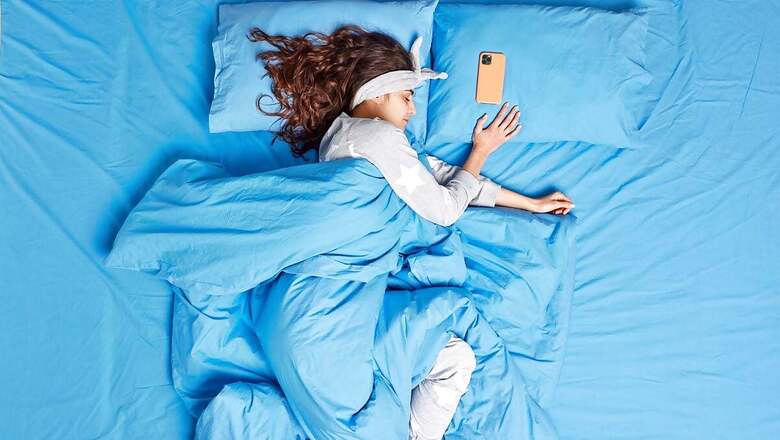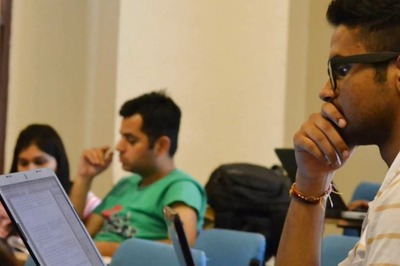
views
Sleep is a crucial bodily function that has a calming effect on the mind and aids in the body’s natural detoxification process, leaving individuals feeling rejuvenated, alert and full of energy. Insufficient sleep can result in cognitive impairment and hinder proper brain function, causing individuals to feel irritable and moody. In addition, it can lead to blood pressure fluctuations, an increased risk of stroke and heart disease, weight gain, and elevated blood sugar levels. Unfortunately, due to high levels of stress and busy schedules, around 35% of individuals fail to obtain sufficient sleep, leading to detrimental effects on their health. Furthermore, poor sleeping habits have been associated with depression, as those suffering from insomnia may experience anxiety and depression.
“Over the last few years, advancements in technology such as smartwatches, fitness trackers, and other devices have allowed for remote monitoring of sleep on a large scale. The data gathered from these devices has provided valuable insights that can aid in the understanding of sleep patterns and the development of strategies to combat sleep deprivation. This has led to the emergence of a rapidly growing sleep technology industry that is attracting a diverse range of players, from start-ups to large tech corporations, and gaining attention from healthcare organisations, employers and policymakers alike,” says Vikram Thaploo, CEO, Apollo Telehealth.
Repercussions of Sleep Loss
The deprivation of deep or slow-wave sleep, in particular, has been associated with numerous chronic health issues such as Alzheimer’s disease, anxiety, dementia, depression, hypertension, and type 2 diabetes. Additionally, it has been shown to have adverse effects on cognitive function, attention and decision-making abilities.
Sleep deprivation not only has negative impacts on health but also carries significant economic costs. In five OECD countries, it is estimated to cost around $680 billion annually, with the United States accounting for $400 billion and Germany for $60 billion. A study conducted in Australia revealed that the direct and indirect costs of sleep disorders equate to 1 per cent of GDP. Additionally, sleep-related absenteeism in the United States leads to the loss of ten million working hours each year, while Japan and Germany suffer losses of 4.8 million and 1.7 million working hours, respectively. Lost sleep also has a substantial impact on productivity, with data from US companies indicating annual costs of $1,300 to $3,000 per employee.
Combating Sleep Loss
Sleep researchers and physicians suggest that individuals can improve their quality of sleep by adopting several lifestyle changes. “These include establishing regular sleeping and waking times, engaging in early-morning exercise, reducing consumption of alcohol and caffeine and avoiding exposure to blue light emitted by screens for at least an hour before going to bed,” adds Thaploo.
In addition to lifestyle changes, technological solutions like consumer wearables have also played a significant role in addressing the global decline in sleep levels. In the United States, the number of patents related to sleep technology has increased by an average of 12 per cent annually over the past 10 years. As a result, market forecasts indicate that the global sleep device market could reach $32 billion by 2026, a significant rise from $11 billion in 2019. Many of these new devices focus on monitoring the quality of sleep, motion, and bio-signals, making it possible to accurately track sleep patterns on a large scale for the first time.
Studies have revealed that consumer wearables have the potential to explore the relationship between sleep and various demographic, socioeconomic, and lifestyle factors, as well as markers of health and ageing. With wearables becoming more prevalent, remote monitoring could prove to be an advantageous tool for physicians looking to gain a deeper understanding of sleep and develop effective treatments for sleep disorders.
“Sleep deprivation is a silent epidemic and can have negative impacts on health, businesses and economies. The consequences of neglecting it welcome an increased risk of non-communicable diseases such as diabetes, obesity, and heart conditions. Programs like Good Nidra makes it easy to analyse the sleeping patterns of patients in their comfortable environment, provide continuously monitored treatment using connected technology and ensure healthy sleep for people suffering from Sleep Apnea.” says Dr Sangita Reddy, Joint Managing Director, Apollo Hospitals Group.
Certain health technology companies have also started utilising behavioural data to assist individuals in establishing better sleep patterns. Data collected from sleep trackers, for instance, can be used to support methods such as cognitive behavioural therapy (CBT), which has been clinically proven to be effective in treating sleep disorders such as insomnia. As CBT is conventionally provided on a one-on-one basis by experts, expanding the therapy to larger populations can be challenging. However, research into novel digital CBT interventions indicates that they can provide an effective and cost-efficient remedy for insomnia.
Way Forward
Sleep deprivation can have negative impacts on personal health, businesses, and economies over the long term. “While consumer wearables and sleep technology are still in the early stages, more research is necessary to prove their effectiveness. However, these developing tools offer significant potential for improving our understanding of sleep, managing sleep-related issues, and promoting overall health and well-being,” signs off Thaploo.
Read all the Latest Lifestyle News here




















Comments
0 comment